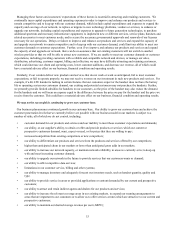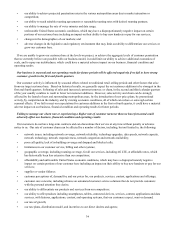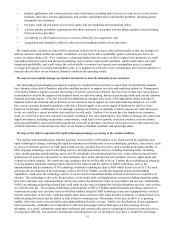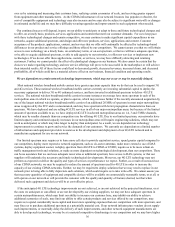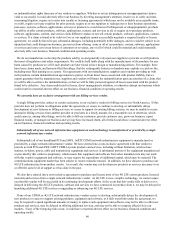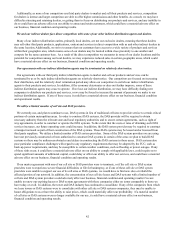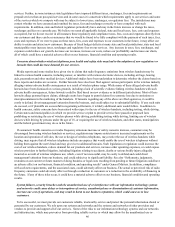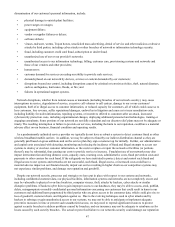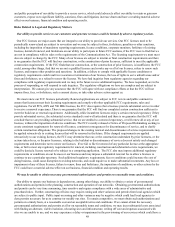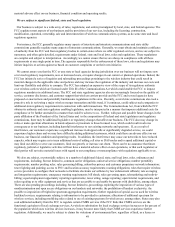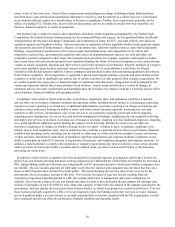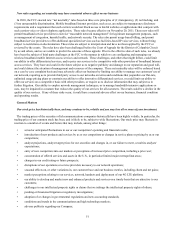Metro PCS 2011 Annual Report Download - page 54
Download and view the complete annual report
Please find page 54 of the 2011 Metro PCS annual report below. You can navigate through the pages in the report by either clicking on the pages listed below, or by using the keyword search tool below to find specific information within the annual report.43
Future regulatory changes may also affect our ability to enter into new or maintain existing roaming agreements on
competitive terms.
Our ability to replicate other carriers' roaming service offerings at rates that will make us, or allow us to be, competitive is
uncertain at this time. The FCC has clarified that broadband commercial mobile radio service, or CMRS, providers must offer
automatic roaming for voice and short message service, or SMS, service both in and out of a requesting carrier's market, on
just, reasonable and non-discriminatory terms, but found that a CMRS provider is not required to offer roaming services if the
request is not reasonable. Carriers frequently disagree on what constitutes reasonable terms and conditions. The FCC will
presume in the first instance that a request for automatic voice and SMS roaming is reasonable if the requesting carrier provides
technologically compatible services. However, in finally assessing whether a roaming request is reasonable, the FCC will
consider the request based on a totality of the circumstances and may use a number of factors, including the extent of the
requesting carrier's build-out where it holds spectrum, and whether alternative roaming partners are available. The FCC also
has extended roaming rights to roaming services that are classified as information services (such as high-speed wireless Internet
access services), and for roaming services that are not classified as CMRS (such as non-interconnected services). This decision
has been appealed by one of the nationwide carriers on the ground that the FCC does not have the authority to mandate data
roaming, and the timing and outcome of the appeal cannot be predicted with certainty. The FCC has not classified these
services as common carrier services. However, the FCC has required carriers to provide roaming services that are classified as
information services on commercially reasonable terms and conditions, including price, but such services are not required to be
offered on a non-discriminatory basis. The FCC has established a complaint mechanism, which may include arbitration, to
resolve roaming related disputes. The wireless broadband mobile wireless industry has continued to experience consolidation
and any consolidation would further reduce the carriers from which we could receive roaming services, including 4G LTE
roaming services. If we are unable to enter into or maintain roaming agreements for roaming services that our customers desire
at reasonable rates, including in areas where we have licenses or lease spectrum but have not constructed facilities, we may be
unable to compete effectively and attract and retain customers, and we may lose revenues. Several of our roaming agreements
can be terminated for breach or if we experience a change in control. We also may be unable to continue to receive roaming
services in areas in which we hold licenses or lease spectrum after the expiration or termination of our existing roaming
agreements. We also may be obligated to allow customers of other technically compatible carriers to roam automatically on our
systems, which may enhance their ability to compete with us.
Further, our roaming agreements and services may be with certain of our competitors and may create actual or potential
conflicts of interest, and may cause the parties to make decisions or take actions that do not reflect the other's best interests.
None of these agreements restricts us from entering into similar arrangements with other parties, but certain rights could be lost
or agreements terminated if we enter into such a similar relationship. If any of the above risks occur, they may have a material
adverse effect on our business, financial condition and operating results.
We may incur higher than anticipated intercarrier compensation costs and be drawn into intercarrier compensation
disputes.
When our customers use our service to call customers of other carriers, we are required in certain circumstances under the
current intercarrier compensation scheme to pay the carrier that serves the called party, and any intermediary or transit carrier,
for the use of their networks. And, as a wireless carrier we are not entitled to receive access payments from interexchange
carriers who route calls for termination on our network. However, the FCC recently adopted an order that significantly reforms
the existing intercarrier compensation scheme, adopting a unified intercarrier compensation regime for all traffic exchanged
between all carriers, including CMRS carriers such as us. This new regime includes a transition period in which rates for the
termination of non-intraMTA CMRS access will decrease over periods specified by the FCC, and will culminate in all traffic
exchanged between carriers being at bill-and-keep, meaning that carriers will not charge each other for the exchange of traffic.
Further, the new regime moves all intraMTA traffic exchanged between CMRS and local exchange carriers to bill-and-keep by
the middle of 2012. The economic outcome of the FCC's new rules is unclear at this time, and the FCC's new intercarrier
compensation rules, may decrease the amount of revenue we receive for terminating calls from other carriers on our network.
The FCC's new intercarrier compensation regime is subject to numerous appeals and petitions for reconsideration, and we are
unable to predict the outcome of such appeals and petitions for reconsideration at this time. In addition, the FCC has released a
Further Notice of Proposed Rulemaking in which it seeks comment on specifics related to the ultimate transition to a bill-and-
keep regime.
We resell third party international interexchange services in connection with certain of our international interexchange
services. The charges for these services may be subject to change by the terminating or interconnecting carrier, or by the
regulatory body or agency having jurisdiction in the applicable foreign country. In the event that the charges change, the
terminating or interconnecting carrier may attempt to assess such charges retroactively on us or our third party international
interexchange carrier, which charges may be substantial, or we may cease providing service to such foreign country, which may


